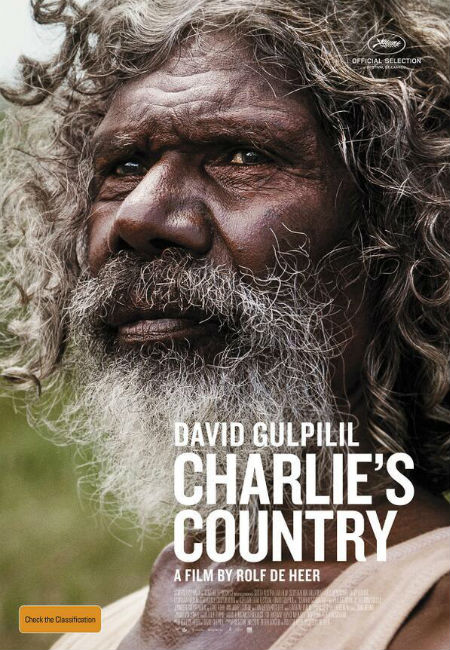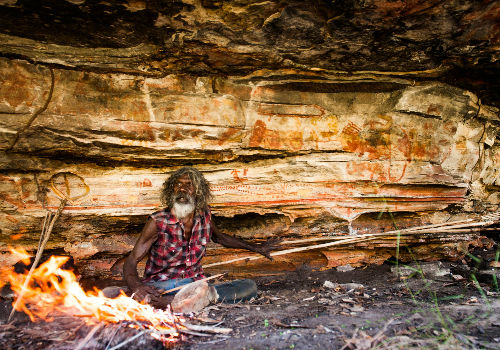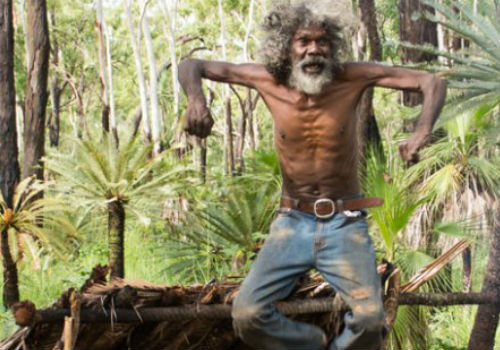
There is an arresting poetic beauty and authenticity to Charlie’s Country, Rolf de Heer’s latest feature film with legendary actor David Gulpilil, that is starkly evident from the silent second to opening shot of the movie in which an introspective Charlie sits in his humpy, lost in mumbling introspection, a tattered photograph held tightly in one hand.
While we aren’t privy to the actual event recorded on the photo – it’s only later we see it is a shot of the opening of the Sydney Opera House in 1973 at which a young Charlie danced for Queen Elizabeth 2 along with other boys from the Northern Territory indigenous community of Ramingining – it is clear that this obviously seminal moment in his life matters greatly to the declining Aboriginal elder.
Choosing to live in his well-ordered timber lean-to in preference to his government-issued house which is too full, he feels, with his extended family, he has reached a point in his life where his past (both his and that of his people) holds more value than his much-reduced present which leaves, in Charlie’s opinion, a great deal to be desired.
Far away from what he affectionately calls his Mother Country, the bush land in which he was born and which provides him with his fundamental sense of time and place and identity, and which he wistfully mourns is “too far” for him to reach at his age, he is besieged at every side by an officious white bureaucracy whose constantly changing laws make no sense to him, and take away from the traditional life he longs to return to.
While he maintains, initially at least, a cordial relationship with at least one of the policemen in town, Luke (Luke Ford) – their exchange of “G’day ya white bastard!” “G’day ya black bastard!” quickly and humourously marks the then-warm bond between the two men – the confiscation of his gun, and that of his friend Black Pete (Pete Djigirr) after a hunting expedition to snag a water buffalo starts souring his tenuous connections with white officialdom.
This deterioration in his uneasy detente with the white culture that controls his every move accelerates as health concerns lead him to bemoan the easy availability of “white men’s junk food”, and as he watches with mounting sadness as his wheelchair-bound friend Bobby (Bobby Bunungurr), his kidneys failing, is taken to Darwin for medical treatment, there to die, Charlie fears, far from his country, family and friends.
Convinced there is little to be gained from continuing to live in Ramingining, Charlie, whose lungs are failing thanks to a lifetime of smoking tobacco and ganja – the scene in which he helps the police apprehend pot growers who are camping in a spot he selected for them is priceless, a sly dig at white culture’s ill-informed and selfish use of Aboriginal culture and skills such as tracking when it suits them – sets off to live in the bush.

And for a short time all is well, his exultation at being back in as close a place as he can manage to his Mother Country written all his face and in the playful banter with which he engages with himself, celebrating the fact that he is living as his ancestors did, that he taken back the control he feels white culture has stolen from him.
It is both poignant and heartwarming to see Charlie back in his element, with Gulpilil’s luminous joy palpable in every moment, his sense of re-connection to the land the tonic that his ailing soul needs.
Particular credit needs to be paid at this point to cinematographer Ian Jones, with whom de Heer has worked on numerous occasions, who brings the country in which Charlie is “dancing” to glorious life, the sweeping shots across the bush-clad plains every bit as beautiful as the happiness writ large on Charlie’s mischievous face, which Jones also celebrates with evocative close-ups whenever possible.
Noteworthy too is de Heer’s deft touch in communicating so much visually with so little, evidenced by the way in which Charlie’s once-raging fire is snuffed out by degrees and then in one feel swoop by the tumultuous rain that pours down from the heavens one night.
Gulpilil’s great talent as an actor is channelling both cheeky stoicism and gravitas, often in the same scene, rendering Charlie as a three dimensional character who embodies the frustrations and anger felt by many indigenous people who watch as their traditional eons-old culture is leached away, replaced it often seems by the very worst of the white culture which, deliberately or not, is steadily encroaching on and replacing it.

While not strictly autobiographical, thanks to the close collaboration between longtime friends Gulpilil and de Heer, who jointly penned the screenplay, it reflects with painful honesty the contemporary experiences of indigenous Australian people, many of whom are caught awkwardly, and often deleteriously, between their watered-down or lost traditional lives and the modern world.
Charlie is emblamatic of this, his return to the bush thwarted by monsoonal rain which gives a him pneumonia and sends him off to Darwin where he falls in with “long grassers”, urban Aboriginals who spend their days drinking heavily ands smoking pot, and eventually prison.
Preceded by a scene that remains with you long ago the film has ended, in which Charlie’s tangled mane of curly grey hair is shorn with brutal, heartless and confronting efficiency to prison standards, transforming this once proud man into a shadow of his former self, you could be forgiven for thinking that the beleaguered Aboriginal elder has reached the end of the road, another troubling victim of clash of cultures old and new.
That there is a slim sliver of hope, a restorative return of sorts to the old ways thanks to friends Black Pete and Old Lulu (Peter Minygululu), at the end of Charlie’s Country is reflective of the nuance and insight that Gulpilil and de Heer bring to the film, and a reminder that through all his travails and small triumphs Charlie never completely loses sight of who he is and where he truly belongs.
It is this constant resilient drive to return to the country from he was literally birthed, and which sustains him still even when he is far away from it, both spiritually and physically, that lends this deeply-affecting, haunting and and richly-rewarding tale so much of its lasting impact and meaning and which stays with you long after Charlie’s final knowing gaze has disappeared from the screen.
This looks awesome. Thanks for letting us know such a movie exists.
You’re welcome. It is a truly remarkable movie and well worth checking out. Profoundly moving.